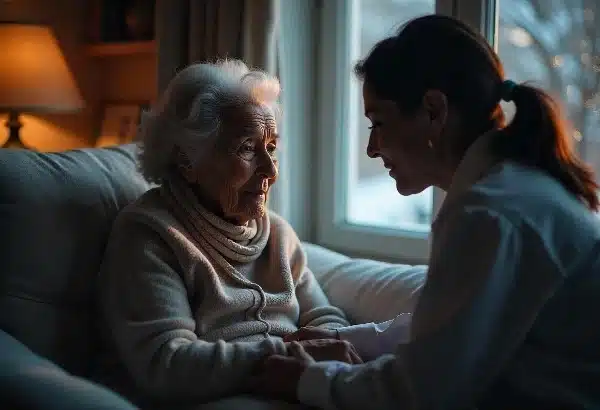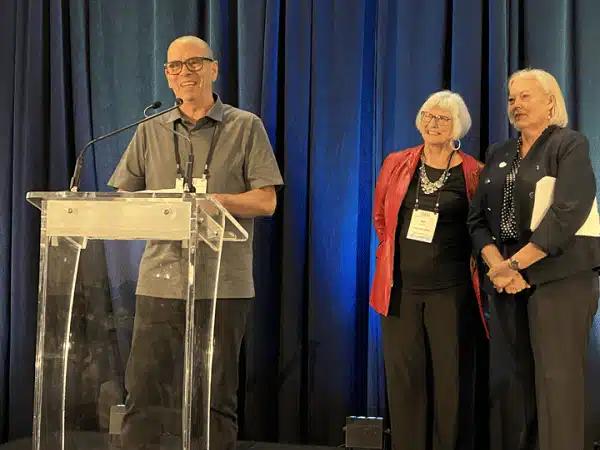Written by Kath Murray & Ann-Marie Gilbert
How it started
As a teenager, I volunteered and poured tea at the small nursing home (rest home) where my great-grandmother lived. It was a few blocks from my high school. Granny celebrated her 100th birthday there, she helped with meal prep and even helped “care for” the six other “old people” who lived there (some who were decades younger than her!).
The care home was family owned and the family lived in the basement with their two children. I approached them for a summer job and was delighted to be hired. It was my first paid employment in caregiving – I loved it and I was loved by those I cared for. The elders in that home, and their families, helped open my door to professional caregiving. This was my introduction to the community in caregiving.
….the possibilities for new models of nursing home care….
Kath Murray
I’ve been part of caregiving for decades and have participated in many different models with varying degrees of success in providing excellent care. When I read Stuart Butler’s article I was intrigued by the possibilities for new models of nursing home care. He discusses the Green House model, multi-age living, and rent-free accommodation for college students willing to socialize with residents and help with chores. (Use this link for an excellent overview of dementia care models.) These are exciting new ways forward, however, as you learn more, each model has challenges.
Another model of care that excites me is the “Dementia Care Village” which originated in Europe. One facility is up and running in Langley, BC and a new facility is being built in the Comox Valley, on Vancouver Island. The goal for dementia villages is that “Care will shift from the traditional model of care to a new social/relational model of care that integrates a person-centered approach to care.” (https://news.gov.bc.ca/releases/2022HLTH0153-000946)
Enough of me. What are your thoughts?
Each of us is part of the caregiving community, and can contribute to creating new models of care that will appeal to us. I am asking you to consider the following questions, maybe discuss with family, friends and colleagues. Come back here to post your responses. Invite the people you talk with to post their responses too. Let’s see what kinds of ideas we can create!
- Which of these care models do you feel needs to be explored?
- Which of these care models appeals to you for yourself or a loved one?
- What do you believe would better support the person and family, simpler and less cumbersome for the care team?
- What can be changed so that a person and their family receive excellent care from the time of admission all the way through to death and following death?
I’d like to hear all thoughts, from family, friends, nurses, PSWs, social workers, housekeeping, and so on. Add your thoughts in the comments. I look forward to hearing your ideas!
Warm regards
Kath









10 Responses
Kathy you are great and thank you for sharing your journey..I started with care giving similar to your journey..My grandmother was caring for her mother at home when I was younger and as a member of the family we wanted to help her..
I believe the family oriented care would be wonderful .. more hands on in long-term care
and the community involvement..and also faith involvement in different ways..brain storming is always helpful
Hi Sherry!
Great to hear from you!
A few years ago someone proposed the idea of “foster-parenting” where families could have one or two elders live with them, and provide care in home.
It is an extension of what your mother did, and I am sure that it blessed you as a child to be part of that care.
After being a child/teenager being exposed to the elders in our family, and loving and caring about them… I am rather pleased now to be the grandmother, the Nana!
The other week I was showing a few of my grandkids the wrinkles that you can see in my elbow, and forearm. We talked about how neat it is to have such cool skin.
How fabulous that they will grow up, thinking that wrinkles are great, rather than strange!
Oh… to have more little ones loving and being loved by our seniors!!
Kath
Kath, it is wonderful to read this article. To see an Victoria example in action, I would recommend that you connect with Luther Court on Cedar Hill Cross Road. They have been very innovative in creating a community model. The model includes a long term residence that provides small, home like environments, a different nursing model, assisted living, independent living and in 2022, the opening of an interdisciplinary Primary Care clinic that has begun to care for people not only in the Luther Court residences but in the Gordon Head and Oak Bay communities. They are currently working to expand services to a broader concept of health by partnering with community groups.
Plans are afoot to develop an adjacent intergenerational complex to will help address the issue of low cost housing for all ages and create opportunities for community building.
Caroline Shires is the Clinical Nurse Leader at Luther Court and you may know her from courses she would have organized with you. I’m sure that she would enjoy talking to you and introducing you to the leadership team.
Hello Andrea SWAN!!
So good to hear from you. And I would love to meet up with Caroline in November.
I have not been at Luther Court for a few years. So, it is great to get an update, and to share it online so that others can look into what is happening as well.
The idea that really intrigues me is the intergenerational house complex!! That seems like a real WIN=WIN!!
Lots of love and care to you Andrea!
Kath
Hi Kath,
I’d love for you to come learn more about our model at Evergreen.
We have tried in many ways to advocate for change – Seniors Advocate, Island Health, local MLA and unfortunately this shows not to be the route.
Think of you often.
Karena
My apologies… I am just seeing this post now! I would love to come and see Evergreen!
I am so sorry that you have not had the support to make the changes that you so want to make!
However, I feel that no matter what the model or the structure at Evergreen, I am so aware of the incredible team work, the commitment, the comradery, the willingness to work together between leadership and those providing direct care – and I am sure that shows to those who are recipients!
When I head north next time, I will try and come for a visit!!
Kath
Personal experience always peaks interest and desire for change. I am just moving my parents, who are in their 80’s, into a new house after 30 years. Their new home has all the needed things on one floor and will be much easier to manage. And after this where will they go? We have few options in our town apart from home care (which is good) and the traditional long term care (must have very high needs to qualify)… and I work there. I would love to see a different model. We do our best to manage people’s care in LTC… but there are a lot of people, short staffed, never enough time or resources…). It is not what they want but the only option we have here. People want to make choices. To have loved ones around them. To feel needed and a part. To not be so scheduled to time lines (getting up, lunch, toileting….). It feels overwhelming to even know where to start to make changes. I am very interested in this conversation and looking into other models of care.
Kirsti,
Interesting to hear your experience, glad to know that you are part of the health provider community, and can feel the stress of knowing that your parents may not have the services they need in the coming months/years.
What is your role in the team?
What creative options do you feel might be possible?
Kath
Hi Kath:
Our household is presently providing palliative care to our daughter’s mother. We live in a multi-generational home which has an extra bedroom suitable for a family member. This is a learning opportunity for all of us as we participate in caregiving through the process. It is evidently not desirable for some extended family members such as Yvettes biological daughter and two of her three sons as they are unwilling or able to care for their mother in their homes. The benefits of dying in a family setting are evident. She sees her grandchildren daily, she communicates with the people who love her in person or by her cell phone, she is provided with the meals she prefers, she has access to helpers immediately and she is not lonely. We interact with healthcare providers as needed and advocate for her so she can get up to date services she may require as the cancer progresses. We try to let her decide what she feels she needs to manage her symptoms in the way of medication and comfort measures. This journey will help all of this household to grow in understanding of the dying process and be united as a family.
I think if our society focused more on promoting in home end of life care we would be better prepared to face this part of every ones journey.
Hi Judi, great to hear from you.
I can only imagine that you and your family will provide wonderful, personal, person-centered care. How fortunate for all of you.
I agree that ‘in home’ care not only can provide excellent care, but can be enriching for everyone. I also think about the idea, of how we can use some of the spaces in our homes to care for other loved ones/friends etc.. or, what it might look like if it was like “foster parenting” to care for an elder.
Love to you and yours,
Kath